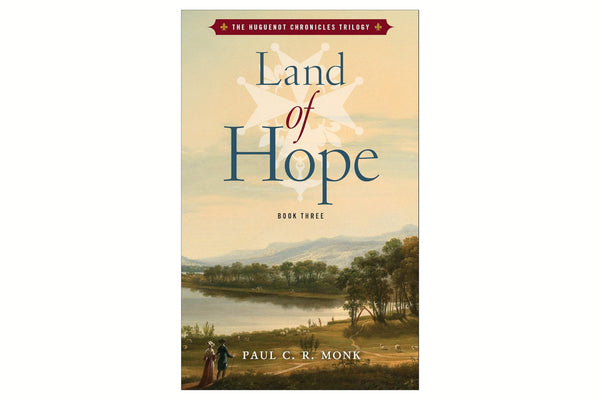Chapter 1 of Merchants of Virtue (Book 1 of The Huguenot Chronicles series)
19 August 1685
Jeanne Delpech de Castanet took a sip from the exquisite Chinese teacup. Suzanne was telling her about the arrival of Monsieur de Boufflers, which had been the talk of the town since yesterday.
‘I wondered why there were so many carts travelling out from Montauban,’ said Jeanne.
‘Were there really?’ said Suzanne with a hint of concern. Then, helping herself to another biscuit, with her usual merriment she said, ‘These ones are flavoured with vanilla, you know.’
Jeanne could not help noticing that her sister not only had put on a little weight, she had aged slightly around the eyes as well. Jeanne wondered if she, too, would look the same in nine years’ time, for that was how many years separated them.
Suzanne was past childbearing age already, which was not a bad thing. While Jeanne suffered her pregnancies with a certain facility, Suzanne had many times lost the baby before its term. But she was happy, and she had her ‘miracle child,’ as she called him. She had also married well, even though her husband, Robert Garrisson, was twenty-five years her senior. He was nonetheless good company, doted on his wife and son, and did not look at all his age.
‘I was telling Robert only yesterday that it was high time I paid you a visit,’ said Suzanne. ‘Really, you ought to have stayed put, dear sister. And I am not so sure your husband will be happy about you returning.’
‘Well, I am not happy about him leaving me on my own. His business concerns seem to be his only preoccupation of late. Wife and children in the country, and Monsieur can do as he pleases.’
‘Worry not your pretty head, my dear. He has been meeting with Robert.’
‘And that Maître Satur, I suspect, soliciting more money for his unscrupulous ventures, no doubt. Anyway, I am here now, and I am certainly not going all that way back, whether Monsieur de Boufflers chooses to stay or not.’
‘Robert fears he has plans to stay,’ said Suzanne, pouring out more tea. ‘And now Robert wants me to leave. But if you are staying, then so shall I! Besides, I got a glimpse of Monsieur de Boufflers yesterday: he did not look at all like the person he is made out to be. In fact, he was all frills and colour, most becoming to the eye.’
‘Clothes do not make the man, Suzanne!’
‘Quite. And did you know, he even showed off his undergarment ruffles!’ said Suzanne with a ring of laughter. ‘I believe it is the fashion in Versailles. But tell me, my dear sister, what is the news from Verlhac?’
Jeanne related the recent tidings from the country: the children’s playacting in the barn, the drought, the lengths to which farmers had to go to irrigate the land, the daily ritual of leading the cows to water, and the proliferation of mosquitoes after the recent storm.
Two pots of tea later, Suzanne showed Jeanne down the flagstone steps to the carriage entrance where a sedan chair was waiting. A bearer stood at either end.
‘Really, my sister, I can walk.’
‘You know what they say: by mid-August, the hazelnut has a full belly!’ Suzanne had a way with words, and would always make them sound like they were chiming inside her. ‘Now, in you get. And send for me as soon as the pangs begin.’
‘I cannot sit in that box.’
‘Well, you must. You are in no condition to cross the filthy streets in this heat. You might slip over. I shall not be responsible for a tragedy! In you go. You, your hazelnut, and all,’ said Madame Garrisson.
Ever since Jeanne could remember, Suzanne won her way in the most mirthful fashion, and always attracted a smile. Jeanne, on the other hand, most often displayed a little thought-pleat across her brow.
‘All right, if you want me to feel like Madame de Maintenon. But I shall send it back so that you can visit when the time comes.’
‘I will, dear sister. I am in haste to meet little Pierre’s new cousin!’
No sooner had Jeanne Delpech sat on the chair than the bearers lifted the poles, and the valet opened the smaller of the front doors. Amid amused rings of laughter from the ladies, the bearers stepped through the door into the sunny street. Then they marched westward across town.
‘Take the market route, would you? I would like to call at Monsieur Picquos’s,’ said Madame Delpech, feeling very much like a Parisian marquise.
*
With a flourish of his lace-cuffed hand the Marquis de Boufflers put the question of conversion to the intendant of Montauban, Urbain Le Goux de La Berchère.
‘Swearing allegiance to the king is not enough,’ said de Boufflers. ‘The king’s policy of one faith and one law must be enforced throughout the entire kingdom! There can be no more exceptions. We need to make this town entirely Catholic. However, it would be most disagreeable to our divine sovereign if we had to resort to the arrest and castigation of his own subjects. But can we avoid it? I have heard Montauban will be the hardest nut to crack.’
They were sitting in the sumptuous oak-panelled chamber of the town hall. Intendant de la Berchère sat back in his barley twist chair behind his walnut desk, arching together his lean fingers. Within the short time since he had taken up office in Montauban, he had come to know what made people here tick.
He said: ‘The Huguenots preach about the individual's right to decide matters of spirituality, my Lord, but they are in truth like all bourgeois. They aspire to pre-eminence and a title. And they will stand in one block behind their prominent members whom they will follow like sheep.’
‘Ah. So if we win over the Huguenot leaders we win the whole town,’ said the marquis with false candour. As commander of the Sun King’s dragoons he had to find out to what extent he could count on the intendant’s complicity. And in fact, de la Berchère was turning out to be sharper and more sophisticated than his solemn and somewhat stoic appearance would have one believe, much more to the marquis’ liking than Dubois, the previous administrator.
‘Undoubtedly, my Lord, if not the whole généralité.’ With a wry smile, de la Berchère reached over and served his illustrious visitor some more of his best Fronton wine.
The Marquis de Boufflers said: ‘Then our first task, before we put forth our propositions, will be to acquire some substance for negotiation.’
‘Indeed, my Lord,’ said the intendant. And to show he not only grasped but also subscribed to the marquis’ allusion to a dragonnade, he added: ‘It will be wise to first remind them that their soft hands and soft bellies will not help them if their heads are too hard!’
‘I could not have put it better myself,’ said de Boufflers. ‘Your name will go down in history, Sir, as the one who saved a multitude from torment and brought the fold back from the precipice of spiritual ruin.’
‘I only seek to avoid unnecessary strife, my Lord, and desire what sits well with our good king . . .’
‘Quite,’ said de Boufflers, thoroughly satisfied, and he raised his glass. ‘To king and country!’
‘To king and country . . . and God!’
*
The pretty backdrop of peachy brick walls appeased Jeanne Delpech, and reassured her of her decision to return to Montauban. This was her home, the provincial town she so loved. Even animal muck and litter from the recent Catholic procession did not put her out. She was so looking forward to the year’s gatherings.
Elizabeth would be eleven this year, Lulu was coming up for three, and little Paul was seven. He had clearly manifested a penchant for structure and order by his observances of God’s tiny creatures that he pinned into his collection. She hoped her mother-in-law would not interfere too much in his upbringing. She hoped too that the Lord would help the king see clearly how the divine design did not advocate idolatry and forced ceremony, but freedom of thought and worship. However, for the time being, she banished such shadows from her brow.
Her bearers came to a halt under the brick arcades of the royal square peopled with shoppers, and then lowered her chair to the ground. She got out and ambled into the spacious, vaulted boutique, its deep shelves packed with rolls of colourful fabric and swathes of drapery.
She had known Monsieur Picquos since her late father arranged financing for him to purchase his boutique. He sold the finest textiles in the generality. But she had not stopped by for cloth. She had dropped in for a rare and expensive edible indulgence that came from Guadeloupe, where he possessed interests in a plantation. She had come to purchase some chocolate, a treat for Jacob, her husband, to sweeten the taste of her defiance.
‘Madame Delpech,’ said the draper with a bow after leaving a customer in the hands of his assistant.
Monsieur Picquos was a co-religionist who had suffered from the restrictions imposed by Louis XIV and his advisers—even if retail was the least affected of occupations, given its direct impact on the royal treasury. Monsieur Picquos, like most Huguenots, had learnt to battle on in the hope that the storm would pass and things would become re-established according to the Edict of Nantes.
‘How nice to see you looking so well,’ Monsieur Picquos continued.
Being in the country for so long had made her quite disregard her physical metamorphosis. It suddenly occurred to her how enormous she must look. But any embarrassment was quelled by experience—this was not her first pregnancy.
She gave him her thanks with a polite smile, and, glancing around, she was reassured to find the shop surprisingly quiet. But it was Sunday, a day when Huguenots, like Catholics, would normally be in church, if it were not for the fact that their Protestant temples had been demolished.
‘When is the happy event due?’
‘As soon as possible, I hope,’ said Jeanne, fanning herself.
‘You won’t be leaving town, then.’ Monsieur Picquos lowered his voice. ‘Many say they are, because of de Boufflers. I have sent my wife and children to my cousin’s, you know.’
‘Oh? But do you really think such a man can cause a whole town to convert in one fell swoop? Just like that, on a whim?’ said Jeanne, half in jest.
The draper looked blankly back at her.
*
Jacob Delpech de Castanet looked out into the street from the bourgeois comfort and coolness of his ground-floor study. He was standing in his tall townhouse in Rue de la Serre. The thick wooden shutters had been left ajar; the windows were closed. Distant church bells announced a quarter to noon as behind him the discussion continued.
‘We are condemned, I am telling you,’ said Maître Pierre Satur, a stout man in his early fifties.
‘The king’s intention is to eradicate all forms of religion, except Catholicism, naturally,’ added Robert Garrisson, Jacob’s friend and brother-in-law. Messieurs Satur and Garrisson were court attorneys and former members of the now banned Huguenot consistory.
Turning to face the room, Jacob said, ‘That would constitute a grave transgression of the law. Would our king be unlawful? Why, article seven of the Edict of Nantes stipulates, does it not, that it is—’
Maître Satur held up his hand, and in the cavernous voice usually reserved for the courtroom, he said, ‘It is permitted to all lords, gentlemen, and other persons making profession of the said religion called Reformed, to exercise the said religion in their houses . . .’ Satur lowered his hand and continued in a more conversational tone of voice. ‘I know it, we all know it by heart, my dear Monsieur Delpech. However, it does not alter the fact that he wants every one of his subjects to convert.’
Robert, who had been seated, stood up with surprising energy for his age, unfurling his lean, tall person made taller by his periwig and heels. ‘Then, tell me, gentlemen,’ he said, ‘would you leave or abjure?’
Maître Pierre Satur tilted his head from side to side as if weighing up the odds, which made his periwig wobble. Then he took a sip from his goblet of Armagnac.
‘For my part,’ said Jacob, ‘forsaking my faith is beyond me. I would rather leave for pastures new if I could.’
‘Indeed, many are preferring exile,’ said Robert.
Jacob continued, ‘But, I cannot. I have my properties and my land. Not to mention my dear wife, who is on the verge of her labours, and who is justifiably against the idea anyway. Our roots are in this soil.’
Maître Satur said, ‘Moreover, it will soon be impossible to leave the town, let alone traverse the frontier. Get caught leaving the country nowadays, and it’s off to the galleys!’ Then, in a graver tone, he announced, ‘Boufflers has declared that his men-at-arms are at but a day’s march. And when they get here, they are to be billeted in Huguenot homes.’
‘Outrageous, surely not!’ said Jacob.
‘You have read the reports from Bearn, have you not?’ said Maître Satur.
‘Yes, yes. I find it hard to believe, though.’
‘And the dragonnades of sixty-one, you believe those, do you not?’
‘Yes, but . . .’
‘They will be here tomorrow, Jacob,’ said Robert solemnly.
With determination, Jacob declared, ‘We are by far the majority here. We shall just have to stand together.’
Jacob’s guests did not react with the same vigour. Instead, lowering his voice, Robert said, ‘And what of our mutual investment? Any news?’
‘None, I fear,’ said Satur. ‘But remember, gentlemen, the higher the stakes, the greater the risk . . .’
‘But you are the one who advised us to pay into it, Maître,’ said Jacob.
‘And I stand to lose a good deal more than anyone.’
Jacob was about to respond when footsteps compelled him to glance out onto the street. He caught sight of two bearers sweating under their felt hats, and between them a sedan chair with the curtains drawn back. His heart quickened with both discontent and contentment now that, along with his children whom he had greeted at home earlier, he once again had a full house.
‘It is Jeanne,’ he said. ‘She need know nothing of this; I do not want to worry her in her condition.’ Jacob rang the little brass bell on his desk and called out to Anette, the maid.
Turning back to his visitors with renewed optimism, he said, ‘But come, gentlemen, the heat has abated, this year’s yield promises to be excellent, we have bread and wine, and we have our faith. Will you do me the honour of joining us for our midday repast?’
END OF SAMPLE













